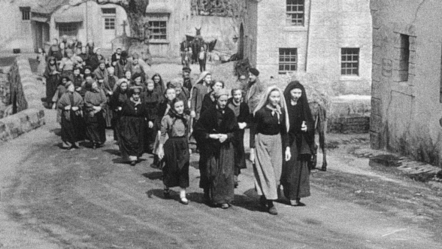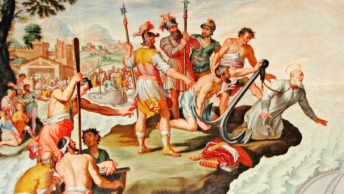A young nurse named Leslie once witnessed something that, according to her, defied medical science. A patient was told by a hospital surgeon that his badly infected leg needed to be amputated—but a few hours later, the doctor discovered that somehow, even though this normally never happened, circulation had returned to the man’s leg, and he was going to be okay. As the mystified doctor later stated to Leslie, “When I walked into the waiting room to talk to the patient’s family, they were all on their knees praying” — something the doctor didn’t really understand. Leslie herself was Catholic, but hadn’t been practicing her religion; however, this miraculous healing caused her to reevaluate things, including the power of prayer, and faith became much more important to her.
Years later Leslie remembered this medical miracle when her own father was in the hospital, awaiting the amputation of his right leg. A blood clot in the leg had caused severe damage; the leg was cold and blue, and her dad couldn’t move it—not even to wiggle his toes— and so the doctor scheduled surgery for 1pm the following day, or even earlier if a spot unexpectedly opened up in the operating room. Leslie and her family were devastated; however, they immediately turned to prayer, and enlisted everyone they could think of to join them: the members of their parish, people from other area churches, relatives, friends, co-workers, and even complete strangers. Leslie’s mom also sprinkled some Lourdes water on her husband’s leg—knowing that many miraculous healings are associated with the pilgrimage site of Lourdes in southern France.
The next day the orderly was supposed to arrive at noon to take the patient down in preparation for surgery, but he was delayed. While waiting for him, Leslie’s mom thought she saw her husband’s toes move, so Leslie removed the sheet so they could all see the leg—and it was no longer cold and blue, but pink and warm and healthy-looking. At the family’s request, a nurse checked for a pulse in the leg, and she found one. Word was sent to the surgeon that everything was suddenly ok; he was skeptical, but promised to reexamine the patient before beginning surgery. Leslie’s dad was taken away by the orderly; soon afterwards, the surgeon came and told them the surgery was cancelled. He admitted he couldn’t explain what had happened, and when he was told of all the people praying for the man’s healing, he replied, “Well, whatever you’re doing, keep it up.” Leslie and her family cried in happiness and gratitude, and she later reflected, “God performs miracles on His time, not ours—and His timing was perfect” (Amy Newmark, Chicken Soup for the Soul: Believe in Miracles, pp. 277ff). Jesus alone is the One Who heals—and sometimes, through prayer, He lets us assist Him in working a miracle.
Suffering and death were never part of God’s plan; they came into the world through human sinfulness. Job’s lamentation (Job 7:1-4, 6-7) expresses the hopelessness and sorrow many people feel in life—but, despite their sins, the Lord does not abandon His people. Jesus came into the world to save humanity from its sins and also allow us to unite our sufferings with His, giving them redemptive value. The Gospel of Mark (1:29-39) describes how He healed Simon’s mother-in-law and many other suffering or possessed persons in Galilee—and His saving and healing power continues to be at work in the world today.
This raises the question: why isn’t everyone healed? Miraculous healings do occur even today; I’ve been involved in several of them, most frequently through the Sacrament of Anointing, and a number of priests, nuns, and other religious leaders have the gift of healing and conduct a healing ministry. Miracles do happen—not only at Lourdes, but around the world and even in our own neighborhood. So why doesn’t everyone receive a miracle? One obvious answer is that not everyone believes in Jesus or has faith in His ability to heal; it’s logical that people won’t receive miracles if they don’t ask for them.
But what about persons of genuine faith who aren’t healed? There are many possible reasons for this. Being in a state of mortal sin, or holding onto a grudge and refusing to forgive someone, are major obstacles to the working of God’s grace. Also, if people haven’t completely surrendered to the Lord and placed their lives in His hands, they’re probably not quite ready for a miracle. It may also be the case that a person needs to grow spiritually or overcome a particular fault before a healing can occur. Furthermore, having to bear the cross of illness or disability may prove to a blessing in the long run, helping a person learn perseverance, humility, trust, and other virtues that wouldn’t be acquired in any other way. Suffering can sometimes prepare us for major challenges or opportunities that will arise later in life, or give us greater empathy toward others who suffer, or allow us to choose to unite our sufferings with Christ’s—quite possibly lessening or even eliminating our time in purgatory. Even if we can’t understand why we’re bearing a heavy cross of illness, disability, or other burdens, we can choose to offer it up as a prayer or sacrifice for anyone or any intention we wish.
Suffering is often a mystery whose meaning and purpose is fully known only to God— but the Lord graciously allows us not only to turn our affliction into a prayer, but to alleviate or even end it through our prayers. Miracles do occur, and as long as we’re willing to submit to God’s divine will, whatever it may be, there’s nothing wrong in praying for a miraculous healing or intervention, whether for ourselves or someone else. Prayer is powerful and life-changing; that’s why Jesus always made a point of going off alone to pray, as today’s Gospel describes. St. Paul (1 Corinthians 9:16-19, 22-23) recognized not only his calling, but his absolute personal need, to preach the Gospel, thereby allowing God’s grace to work through him. In a similar way, you and I are called to live out our faith so that the Lord may work in and through us—whether through everyday moments of grace, holy coincidences, or even miraculous healings. The more we pray, the more such things will occur, and the more we give thanks for God’s gifts, the more blessings we will receive. Jesus continues to work signs and wonders through His Church, and— if we’re willing— He will allow this same dynamic to unfold in our lives.








